|
|
|
Sort Order |
|
|
|
Items / Page
|
|
|
|
|
|
|
| Srl | Item |
| 1 |
ID:
089565


|
|
|
| 2 |
ID:
113776
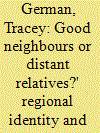

|
|
|
|
|
| Publication |
2012.
|
| Summary/Abstract |
Conceptualization of the South Caucasus as a distinct regional unit is a relatively new development. Notwithstanding geographic proximity, the three states of the region face different political, economic and security realities, precipitating different strategic orientations. Conflicting dynamics complicate relations between states and serve to undermine efforts, both internal and external, to establish a sense of regional identity and advance inter-state cooperation. This paper argues that the concept of a distinct 'South Caucasus' region is an externally generated, geographical label, which implies a certain degree of unity and positive interdependence that does not exist. The three states may be geographical neighbours, but they are not 'good neighbours', as the complex web of enmities that has developed over the centuries means the three states tend to look externally to 'distant relatives', undermining both regional cohesion and awareness.
|
|
|
|
|
|
|
|
|
|
|
|
|
|
|
|
| 3 |
ID:
174728
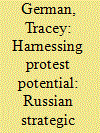

|
|
|
|
|
| Summary/Abstract |
The perceived threat posed to Russia from so-called colored revolutions–popular uprisings attributed by Moscow to malign sponsorship by external forces–has become a central theme in Russian security discourse. This article analyses how colored revolutions came to be characterized as a specific threat to national security and how they continue to shape Russian thinking about the changing character of conflict. It explores Russian perceptions of the threat from colored revolutions, using the concept of strategic culture as a framework to analyze these perceptions through an analysis of the Russian military theoretical literature and strategic documents. The article establishes that concerns about non-military means of destabilization reflect continuities in Russian strategic assumptions about adversaries and how they seek to achieve their national objectives. It also reveals the perpetuation of specific narratives about the country’s vulnerability to foreign interference.
|
|
|
|
|
|
|
|
|
|
|
|
|
|
|
|
| 4 |
ID:
138951
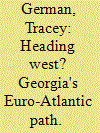

|
|
|
|
|
| Summary/Abstract |
Events in Ukraine in 2014 are likely to transform the presence and role of western institutions such as NATO in the post-Soviet area. The crisis has starkly revealed the limits of their influence within Russia's ‘zone of privileged interest’, as well as the lack of internal unity within these organizations vis-à-vis relations with Moscow and future engagement with the area. This will have long-term implications for the South Caucasus state of Georgia, whose desire for integration into the Euro-Atlantic community remains a key priority for its foreign and security policy-makers. This article examines the main motivators behind Georgia's Euro-Atlantic path and its foreign policy stance, which has remained unchanged for over a decade despite intense pressure from Russia. It focuses on two aspects of Georgia's desire for integration with European and Euro-Atlantic structures: its desire for security and the belief that only a western alignment can guarantee its future development, and the notion of Georgia's ‘European’ identity. The notion of ‘returning’ to Europe and the West has become a common theme in Georgian political and popular discourse, reflecting the belief of many in the country that they are ‘European’. This article explores this national strategic narrative and argues that the prevailing belief in a European identity facilitates, rather than supersedes, the central role of national interests in Georgian foreign policy.
|
|
|
|
|
|
|
|
|
|
|
|
|
|
|
|
| 5 |
ID:
167119
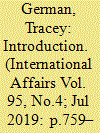

|
|
|
|
|
| Summary/Abstract |
Russia's actions in Ukraine, the rise (and apparent fall) of Islamic State in Syria and northern Iraq, and Chinese activity in the South China Sea have kindled renewed debate about the character of war and conflict, and whether it is undergoing a fundamental shift. Such reflections and assertions about the apparent transformation of conflict are not new; one of the enduring features of conflict over the centuries has been its state of flux. What is new is the pace of such change, accelerated by the ongoing technological and communications revolution. Individuals can now communicate and engage with one another across state boundaries to an unprecedented extent and in new ways, adding to the complexity of the international environment. The debate about whether the character of conflict is changing is not a purely philosophical pursuit: it has real-world implications, for how states envision the character of conflict shapes how they plan and prepare for war, from defence policy to procurement and from doctrine to training. Thus, it is imperative to consider the types of conflict in which states perceive themselves to be, or risk becoming, involved. That is what this special issue of International Affairs sets out to do, exploring how different states plan for and predict the future character of war and conflict, how the experiences of individual states foster different visions of future conflict and how states envisage military force being used, either by themselves or by potential adversaries.
|
|
|
|
|
|
|
|
|
|
|
|
|
|
|
|
| 6 |
ID:
170462


|
|
|
|
|
| Summary/Abstract |
NATO’s 1999 Kosovo campaign was a pivotal moment in Russia’s worldview and its post–Cold War evolution, prompting an enduring period of estrangement and alienation from the West. It has had a profound and lasting impact on Russian policy and strategic thought vis-à-vis the international system and the use of force, as well as the balance of power amongst different sections of the country’s foreign policy elite. This article focuses on the enduring consequences of NATO’s intervention for relations between Russia and the West, as well as on how the operation has shaped Russian strategic thought and its views on the character of conflict in the twenty-first century. It explores three themes that emerged in the wake of Operation Allied Force: questions over European security, specifically how it is provided and by whom, as well as Russia’s role; challenges to the existing liberal international order and the norms underpinning it; and the evolution of Russian military thought and defense policy post-1999.
|
|
|
|
|
|
|
|
|
|
|
|
|
|
|
|
| 7 |
ID:
153843
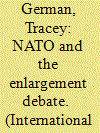

|
|
|
|
|
| Summary/Abstract |
The enlargements of the post-Cold War era have undermined NATO's stated objectives vis-à-vis the purpose of incorporating new members and exposed tensions within the alliance over the twin pillars of the 1967 Harmel Report, namely deterrence and dialogue. NATO's stance on enlargement has not only undermined Euro-Atlantic security and triggered new divisions between East and West, it has also exposed aspirant states, particularly those in the post-Soviet space, to sustained pressure and coercion from Moscow. This article examines the rationale for NATO enlargement in the post-Cold War era, focusing on the two post-Soviet aspirant states, Georgia and Ukraine. While these two states contribute, as partners, to the alliance's efforts to advance cooperative security, the issue of their prospective membership threatens to undermine alliance security and cohesion, and their ambitions are therefore unlikely to be realized in the foreseeable future. With Russia taking an increasingly assertive stance on the global stage and uncertainty surrounding the direction of US foreign policy under the presidency of Donald Trump, the issue of NATO enlargement is unlikely to be a priority for the alliance over the next few years. If NATO ultimately rejects any prospect of membership for states in the post-Soviet space, they could be abandoned to Russian influence, indicating that Moscow has a de facto veto over membership of the alliance and conceding spheres of influence to Russia.
|
|
|
|
|
|
|
|
|
|
|
|
|
|
|
|
| 8 |
ID:
188297
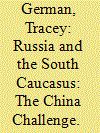

|
|
|
|
|
| Summary/Abstract |
Russia has sought to maintain its influence in the South Caucasus by a variety of means, viewing the region as an area of crucial importance for its core strategic interests. However, China’s prominence in the South Caucasus has increased significantly over the past decade, as the South Caucasus states seek to diversify their diplomatic and economic ties. This essay explores whether Russia’s regional hegemony in the South Caucasus is being challenged by China: does China’s growing engagement with the states of the South Caucasus pose a challenge to Russian influence within its traditional zone of ‘privileged interest’?
|
|
|
|
|
|
|
|
|
|
|
|
|
|
|
|
| 9 |
ID:
116309
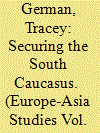

|
|
|
|
|
| Publication |
2012.
|
| Summary/Abstract |
In the wake of the 2008 conflict with Georgia, Russia has re-established itself as the dominant actor in the South Caucasus, consolidating its military presence in the region and reinforcing its already substantial diplomatic and economic levers. This essay examines recent Russian policy towards the region as Moscow attempts to counterbalance growing Western involvement within what it perceives to be its zone of 'privileged interest', focusing on military aspects of its policy towards Abkhazia and South Ossetia, and the implications for security across the South Caucasus.
|
|
|
|
|
|
|
|
|
|
|
|
|
|
|
|
|
|
|
|
|